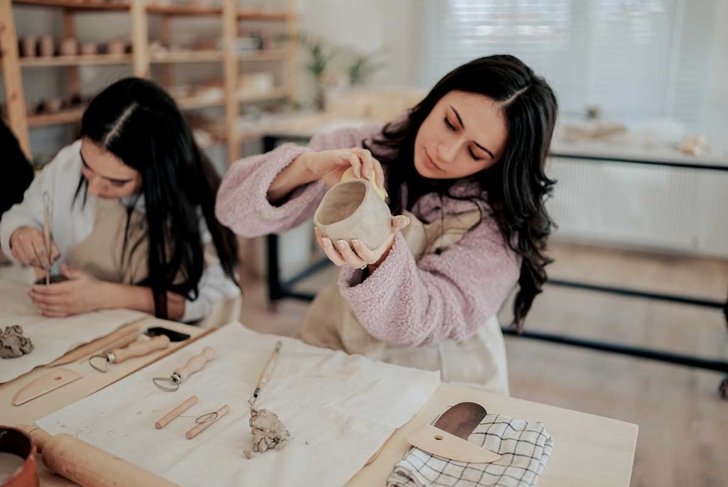When Anna Potter, a florist based in the UK and a well-known figure on Instagram, first started her career in a flower shop, she was astounded by the number of inquiries she received from customers regarding tulip care. Unlike many other cut flowers, tulips keep growing once they are placed in water, leading to unpredictable behavior in floral arrangements. Her clients were eager to learn how to prevent the stems from bending as they continued to grow.
Although she shared tips for reviving droopy tulips, Potter felt uneasy doing so at that time. Reflecting on those early days, after more than 14 years managing her own shop, Swallows & Damsons, in Sheffield, England, she understands now that her discomfort stemmed from a connection to the rebellious nature of those tulips.
“Tulips are a beautiful reminder to stay true to oneself and to avoid the pressure of conforming to others’ expectations,” Potter states, having cultivated a distinctive floral design approach that celebrates asymmetry and the untamed aspects of nature.
Potter’s experience with tulips illustrates how engaging with flowers can provide valuable insights for personal development. In her latest book, Flower Philosophy: Seasonal Projects to Inspire & Restore (Quarto Publishing, 2023), the bestselling author delves into how flower arranging can serve as a therapeutic tool, aiding in self-acceptance, navigating life’s transitions, and fostering a deeper connection with nature.
This book contributes to the increasing recognition that flowers offer more than surface beauty. Research indicates that engaging with flowers through our senses can markedly enhance our physical and emotional health.
A showstopping attraction
Flowers are inherently captivating. Their main role is to facilitate plant reproduction. Plants that depend on pollinators—like bees and butterflies—have evolved vivid petals and enticing fragrances to draw these creatures in. Unsurprisingly, humans are equally enchanted by these floral wonders.
“They possess the power to capture our attention,” Potter remarks, noting how flowers instantly impact customers who enter her shop. The sight of the blooms “pulls them away from their hectic daily routines and transports them somewhere entirely different.”
This shift in focus from overwhelming mental to-do lists to the present moment encapsulates the essence of mindfulness, a practice centered on becoming aware of our thoughts and surroundings. Mindfulness has been associated with reduced anxiety and depression levels.
Simply admiring flowers can lower physiological stress indicators, such as elevated blood pressure and cortisol levels. It can also diminish negative emotions and anxiety. Impressively, these positive effects are consistent even when viewing merely an image of a flower.
Every rose has its thorns
Potter likens floral arranging to painting—a visual expression that utilizes the hues and textures of flowers to convey a personal message.
However, floral design is also a tactile experience. It encourages interaction with the various elements of a flower. Paying attention to flowers in such detail acts as a soothing escape for Potter when she feels overwhelmed by looming deadlines. She might observe that the leaves of a flower have been eaten by insects or that a bloom has an unusual double-head—quirks that remind her not to dwell on achieving perfection.
“Accepting the imperfections of nature is one of the greatest gifts I have ever received, as it helps me embrace myself,” she shares.
Working with flowers can provide comfort not only in our times of vulnerability but also for our most at-risk groups. Research indicates that activities involving floral arrangements can enhance motor skills for elderly individuals with dementia, alleviate pain and psychological symptoms in fibromyalgia patients, and improve cognitive function among individuals dealing with schizophrenia or traumatic brain injuries.
If floral arrangement doesn’t suit your preferences, consider another hands-on floral task. Planting or pressing flowers are also effective stress relievers.
Stop and smell the roses
The unique fragrances of flowers present another avenue through which their influence is felt. Potter finds that the scent of a bloom, a fresh-cut stem, or even its sap can evoke strong memories and associations.
“I often find myself transported back to childhood memories where I was creating, exploring, or being curious in nature,” says Potter. Tapping into that carefree aspect of herself serves as a balm amid the pressures of a productivity-focused lifestyle.
Studies support the notion that floral scents can help soothe frazzled nerves. For instance, the aroma of rose oil in a work environment can decrease job-related stress. Similarly, lavender essential oil’s fragrance can enhance sleep quality for those with sleep difficulties.
Breathing in floral scents can also have medical benefits. One study revealed that aromatherapy using gardenia essential oils can help reduce lung inflammation in patients with chronic obstructive pulmonary disease (COPD).
Ingesting flowers—only the edible varieties, of course—is another form of floral therapy. Edible flowers offer numerous nutritional, antioxidant, and antimicrobial benefits. Tinctures made from floral essences have been found to alleviate labor pain during childbirth and reduce anxiety, as well as binge eating in people struggling with weight.
No matter how you engage with the healing properties of flowers, numerous benefits await.
Floral arranging 101
Here are some tips from Potter for beginners:
- Use what’s available: Incorporate seasonally abundant plants—even weeds like dandelions.
- Experiment with color: “Sometimes the most unlikely, clashing colors can create something utterly magical and mysterious in a bouquet,” Potter suggests.
- Go for variety: Combine plants with different bloom sizes, textures, and heights for balance and fullness.
- Think outside the vase: “Any container that can hold water can serve as a vessel for flowers,” she advises.
Yes, CBD is a flower
Hemp-derived CBD oil is extracted from various parts of the hemp plant (cannabis sativa), particularly the unpollinated flowers. Research has shown that CBD might help relieve pain, reduce anxiety, and aid in normalizing elevated blood pressure, among other benefits.
Shop sustainably
A significant portion of cut flowers in the US is sourced from overseas. The transportation and refrigeration processes contribute to carbon emissions that impact climate change. Opting for seasonal, locally grown flowers can help reduce this environmental footprint.





